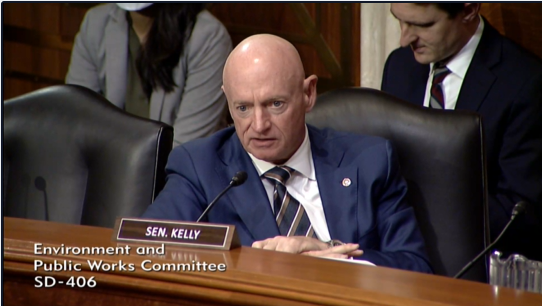WATCH: Kelly Highlights Arizona Highway Infrastructure Needs in Hearing with Federal Highways Administrator
This week, during a Senate Environment and Public Works (EPW) Committee hearing with the Federal Highways Administrator, Arizona Senator Mark Kelly highlighted the need for improved access to federal highway funding for small, rural, and disadvantaged tribal communities and the importance of state Departments of Transportation (DOTs) having the necessary resources to support these communities as the committee starts to think about the next surface transportation bill.
Kelly, who championed the bipartisan infrastructure law to make historic investments in highway infrastructure across the country, discussed the barriers these communities face in accessing federal funding, such as securing local match funding and obtaining technical and grant writing assistance. Additionally, he recognized Arizona’s AZ SMART Fund as a model for aiding other cities, towns, and counties in making grant applications more competitive.
“The bipartisan infrastructure law, which passed the Senate nearly three years ago now, has allowed FHWA to make historic investments in highway infrastructure across the country,” said Kelly. […] “As this committee starts to think about the next surface transportation bill, I hope we can examine ways to support small, rural, disadvantaged, and tribal communities to ensure that the state DOTs—departments of transportation—have the resources to help them take advantage of funding opportunities.”

Click here to watch Sen. Kelly’s full exchange with witnesses. See the transcript below:
Sen. Kelly: Thank you, Mr. Chairman. Administrator Bhatt, thank you for being here and great to see you again. The bipartisan infrastructure law, which passed the Senate nearly three years ago, now has allowed FHWA to make historic investments in highway infrastructure across the country.
But I continue to hear from small, rural disadvantaged communities across Arizona about the barriers that they face to access these new funding resources, and these barriers can range from finding the funding to contribute a local match to getting technical assistance and grant writing assistance when they’re actually applying for the grants.
And as this committee starts to think about the next service transportation bill, I hope we can examine ways to support small, rural and disadvantaged communities and tribal communities to ensure that the state DOTs—departments of transportation—have the resources to help them take advantage of funding opportunities.
So, administrator, can you talk about what action FHWA has already taken to provide support and technical assistance to help communities apply for discretionary grants and what guidance have you provided to the state departments of transportation to help them provide support and technical assistance as well?
Administrator Bhatt: Thank you, Senator Kelly, and yes, absolutely. We want to make sure that the bipartisan infrastructure law resources don’t just flow to traditional recipients such as State DOTs. I know Director Toth, you know from her time both in the city of Phoenix and now as the director. And I know she shares your concern.
We, as federal highways, we have division offices in every single state. We’re providing technical assistance to local recipients. There’s a wonderful lady named Maria Zimmerman at USDOT, whose job is to go out and to reach out to people. Sometimes it’s even hard to reach out to people where they are, but we’re going to be committed to going out, meeting small communities, tribal entities because we want to make sure that they are successful recipients and deliverers of these projects.
Sen. Kelly: Does any of this stuff that you’re doing, this outreach, is it new or is it something that’s been in place for a number of years?
Administrator Bhatt: Some of it we’ve always done, but obviously it’s scaled because of the bipartisan infrastructure law, but particularly under the IRA there was $100 million that was set aside. You know, to one of the specific outcomes was this technical assistance and we are using those resources to add new consultation and TA.
Sen. Kelly: Any statutory limitations that you’ve run into that might make it harder for you to help communities?
Administrator Bhatt: Senator not that I’m aware of off the top of my head, but happy to follow up with your staff if there’s anything that we can do to make that better.
Sen. Kelly:In Arizona, our State Department of Transportation established a program called the Arizona Smart Fund, which provides some planning assistance and local match support for cities, towns and counties that are seeking federal funding. How can FHWA help state DOT who establish programs to help localities make grant applications more competitive, like this Arizona Smart Fund?
Administrator Bhatt: Thank you, Senator Kelly. Appreciate Arizona’s leadership in the space. I actually am where I am in my career today because in Kentucky, I helped a small town get $200,000 for sidewalks, which might as well have been $200 million because they never would have been able to afford it on their own. And I’d love to reach out to your staff or to Director Toth to figure out how we can scale Arizona’s efforts.
Sen. Kelly: And then on a different subject on The Rocks Act. So, this is a provision that I helped with that was in the bipartisan infrastructure law. It creates a working group for aggregates like sandstone gravel, which are, as we all know, the building, literally the building blocks of infrastructure. And this working group would ensure that sufficient sources of aggregates exist here in the United States to support increased demand due to the infrastructure funding. So, can you provide an update on what steps have been taken in recent months to stand up the working group to support The Rocks Act?
Administrator Bhatt: Thank you, senator. And I as a project delivery person, appreciate your support for obviously these building blocks. I believe we have identified the members of the committee and I’ll get you the specific steps that we’ve taken in recent months.
Sen. Kelly: All right. Thank you, and I yield back my 3 seconds.
